Hello, this blog is for posting things I find interesting like critical opinions about media and fanarts. PS: NO spicy fanart on this blog
126 posts
Latest Posts by rosehen96 - Page 2
some of you need to go outside and I dont mean that in a mean or condescending way I mean it in a "you would benefit from talking to real people face to face, and developing social skills" type way




friends
i think as a writer, the older you get and the more you read, the more you realize there are very few actual truly bad ideas. which is a relief. but! the other thing you learn is that stories live and die on the execution and ha ha. lemme tell you. unfortunately. there are lots and lots of bad ways to execute an otherwise fine idea
Any thoughts on the Russian-Ukraine stuff or would you like to keep your opinions to yourself?
There is literally nothing I need to say in this situation.
I am watching and listening, and helping where I can. My opinion is irrelevant in the face of much more difficult things real people are facing.
I've seen many Russians make statements online apologizing on behalf of the country - cursing it, cursing Putin, cursing the government, and tearfully explaining how disgusted they are by it all, and how ashamed they are of being Russian.
I understand the urge, I really do, but the problem is that it ultimately does nothing. No matter how hard you punch yourself, your friend's wounds will not heal. That's not how it works.
At the moment, all anyone can do is:
Listen and read instead of posting - and think critically about which sources you get your news from (US media tends to be sensationalist, and Russia media is largely propaganda). There's also tons of misinformation online, and I've been trying to avoid posting/reblogging anything that I cannot 100% confirm as true.
Help out those directly affected by events - but be mindful of scams! Paypal and venmo is not available in the Ukraine, this is true. BUT - many Ukranians, especially those who have lived or live abroad are able to use it through connecting overseas banks or cards, and they CAN channel that money to family. It's ultimately YOUR responsibility to fact-check this before you reblog anything asking for donations. Be mindful of what you spread.
Keep informed and don't just spread fearmongering images/fatalist threads. Ukranians are currently trying to stay safe. Poland has opened borders to everyone with a Ukranian passport and suspended VISAs, and there is talk of other neighboring countries doing the same. They don't need more tweets about bombings. They don't need your jokes about WWIII and being drafted.
Ultimately I'm taking a seat and doing as much as I can, but the last thing you all need to hear is my casually uninformed opinion - or ANYONE'S uninformed opinion. Tweeting about current events does not make anyone an expert in foreign policy. If you're wondering what you should do - sometimes, the answer is 'nothing'.
Sometimes, not causing any extra damage through misinformation is the best thing you can do.
Once you become a certain age, it is your responsibility to unlearn behaviors that hinder your growth as a person.
When writing a blind character, what are some things to avoid?
Ah! So this is definitely a bit of a broad question, but I can give a few basics:
Blind people don’t actually give a shit about touching faces, so please, please stear clear of that. The only exceptions may be the same way sighted lovers may caress each other’s faces and parents may hold a child’s face in an emotional moment, but it’s just like a sighted lover or parent would, nothing more.
Please avoid giving your character a cure. One of the most crushing things as a disabled reader is to finally have a disabled character, but for them to end up with a fantastic magic cure half-way through. It rarely makes for a good story, and often a much better story is that person’s journey in understanding themselves as equal and learning that they aren’t broken and useless and can do whatever they want, overcoming internalized ableism rather than “overcoming the disability.”
Few blind people actually wear sunglasses or eye coverings, so your character probably won’t either if the likelyhood says anything. Chances are they will not be part of that minority, so probably better not to do that.
Something similar can be said for characters with white or cloudy eyes. The vast majority of blind people will not have very abnormal-looking eyes, so chances are your character will not be part of that minority.
Another very similar thing should be noted about the level of vision they will have. Somewhere between 80 and 90% of blind people have some level of remaining vision, weather it be little more than light perception or enough that they were forced to use their eyes a lot growing up and weren’t taught braille or to use a cane because they could get by well enough not to die most of the time.
So these are just the first several things I can think of at the moment, but definitely feel free to ask about more things!

New zine that's free for anyone to print and distribute! Read the whole thing at newlevant.com/COVIDzine or in the rest of this post.
![COVID zine page 1
Unless you make it a hobby to follow COVID news and studies, you're probably going off old info.
[stack of word balloons coming from different directions]
"COVID is mild now"
"The pandemic is over"
"'Pandemic of the unvaccinated'"
"COVID is like the flu"
"Only 'high risk' people need to worry about it."
"There's nothing you can do."
Businesses have a clear interest in YOU not worrying about COVID, and governments want to claim "victory" by hiding the problem.
They want you at work, shopping, traveling, and going to events just like you did in 2019--NOT demanding sick pay, clean air infrastructure upgrades, etc.
The CDC didn't want to admit COVID is airborne because it would open employers up to workplace safety lawsuits.
Masks are a visual reminder of the ongoing danger.
In a 2020 study, people who complied with mask mandates spent *25% less time shopping.*
In 2021, the CDC shortened their COVID isolation guidelines...at the request of Delta Airlines' CEO.](https://64.media.tumblr.com/70f4a45cc6729eb54213adc93a244c91/6e08ec8bc6a9f91c-6a/s540x810/40c5f82a90fbfcd9308bb71295f2e024865f8c63.png)
![COVID zine p2
Here's the real tea:
[handwritten, bold text] COVID is airborne & movies like smoke.
Because the virus is transmitted by respiratory aerosols--the fog that you can see exhaled on a cold day.
Could you smell if someone was smoking? Then you could inhale their COVID virus.
[Cartoon of a person standing near 2 cigarette smokers, surrounded by smoke.]
This is why airflow, filtration, and limiting contacts are key to stopping infections.
[handwritten, bold text] Six feet apart /= safe
That's old news, from when scientists *hoped* COVID was mainly spread by large droplets.
Turns out, it can hang out in the air for hours.](https://64.media.tumblr.com/d4ed69cd00fc62c3209301b810b05945/6e08ec8bc6a9f91c-9c/s540x810/59bddd0de857ee737723c1a4fbd4316aaccf4a41.png)
![COVID zine page 3
[Bold, handwritten text] COVID is still everywhere.
At least half of COVID spread is from people who don't (yet) have symptoms.
With no paid sick leave and too-short isolation guidelines, people are regularly forced to work while infectious.
[Cartoon of a waitress, unmasked, looking abashed, surrounded by an infectious cloud, saying "may I take your order?" Many jobs now disallow masks!]
The CDC stopped tracking COVID tests, so now the best way we have to estimate how many people have COVID: wastewater testing. Virus levels in sewage closely follow actual cases.
[Cartoon of a toilet with viruses getting flushed]
[Graph of Biobot COVID wastewater levels from jan 2020 to Feb 2024, showing 929 copies per mL on Feb 17]
[Cartoon of me, looking at the graph, saying "More cases than ANY TIME in 2020. Not great."]](https://64.media.tumblr.com/bb874c4d1c8f30268603f43932f69b9d/6e08ec8bc6a9f91c-86/s540x810/646341b469f2ffeeaeee27905d04f905241b071f.png)
![COVID zine p4
[Conversion chart of Biobot wastewater levels measured in copies/mL to what percentage of the population is infectious. They are from https://pmc19.com/data/ and @michael_hoerger on twitter.]
Using the national measurements from Feb 2024, approx. 1 in 36 people were infectious with COVID.
[How Does Risk Increase with More Social Contacts? conversion chart]
[Cartoon of me, looking tired, wearing a respirator, pointing up at the chart. I'm in a crowd of people, drawn in silhouette, and clouds of COVID.]
You can see how the risk skyrockets with crowds.
U.S. residents can estimate how many people are infectious with COVID in YOUR area NOW with data from your nearest wastewater testing facility: biobot.io/data/covid-19 [QR code]](https://64.media.tumblr.com/b256a70f986d0a87c31e2b44de2d7379/6e08ec8bc6a9f91c-80/s540x810/6b9462e881a07495d0668c48deb0cb4a6b19bfe8.png)
![COVID zine p5
[Bold, handwritten text] COVID is really dangerous.
[Cartoon of a person's circulatory system]
COVID isn't just a respiratory illness. It injurs the blood vessels and can damage nearly any organ, all over your body.
Even mild infections cause brain shrinkage equivalent to aging 1 to 10 years.
Each infection has a ~1 in 10 chance of causing new, lasting symptoms, aka Long COVID. This is true for kids AND adults.
Long COVID can present in all kinds of ways. Even cases that start mild can become debilitating.
[Cartoon of a person lying down and wearing an eyemask, surrounded by handwritten descriptions of potential Long COVID outcomes]
Can't read, watch TV, look at phone, listen to music.
Brain fog, hard to even think.
In pain, feel like you have the flu for months on end.
Have to lay in the dark and quiet.
See pandemicpatients.org for an extensive list of Long COVID and Post-COVID Conditions: [QR code]](https://64.media.tumblr.com/336c66151ff4a89c3afb3e9acb4f4d17/6e08ec8bc6a9f91c-21/s540x810/fd187dd5c0a971eed19fb6d9ee6585594f0613f2.png)
![COVID zine page 6
[Graph labeled "Excess Deaths and COVID Deaths in Young Adults (age 18-49)". The "excess deaths [all cause]" number is at about double "COVID-19 deaths".]
So far in 2024, at least 1,000 people are OFFICIALLY dying of COVID in the U.S. every week. Chances of having a heart attack or stroke go WAY UP after a COVID infection, so it contributes to many more deaths than the official count.
[Bold, handwritten text] Repeat infections are hurting us.
The chances of bad shit happening get higher each time you get infected.
Viral fragments have been found in tissue samples even 12 months post-diagnosis. Viral persistence is a likely mechanism of Long COVID.
COVID disregulates the immune system, even in recovered patients. We're seeing outbreaks of RSV, monkeypox, polio, TB and more--possible signs of widespread immune dysfunction.
[Chart labeled: "Fig. 5: Cumulative risk and burden of sequelae in people with one, two, and three or more SARS-CoV-2 infections compared to noninfected controls."
It lists the following bad health outcomes, showing that each is more likely after 1 infection, more likely after 2 infections, and even MORE likely after 3 infections:
Hospitalization
at least one sequela
cardiovascular
coagulation and hematological
Diabetes
Fatigue
Gastrointestinal
Kidney
Mental health
Musculoskeletal
Neurological
Pulmonary]](https://64.media.tumblr.com/04a49df42eade89e54d6d94baed4e42a/6e08ec8bc6a9f91c-6f/s540x810/3d8d8966fc746a1fb19961ea72df138671009dda.png)
![COVID zine page 7
[Bold, handwritten text] Vaccines and "hybrid immunity" are not enough.
COVID vaccines create antibodies that fight infection. They've greatly reduced hospitalization and death from acute infection. But antibody levels quickly decline over the following months. Vaccines aren't stopping people from getting infected, spreading COVID, and long-term damage
[diagram of SARS-CoV-2 infection. The virus is covered in spike proteins, and there are circulating antibodies, some of which bind to the spike proteins. There's a human cell covered in ACE2 receptors. When a spike protein binds to an ACE2 receptor, that's cell infection. When an antibody binds to the spike protein, it can't infect!]
COVID keeps mutating, with new shapes in the spike protein that evade old antibodies. You can get reinfected with a different variant, even in weeks.
[Bold, handwritten text] COVID vaccines are like an airbag. Avoiding exposure is like keeping your hands on the steering wheel.](https://64.media.tumblr.com/164acb826a6b5f4f65b2715302d9112a/6e08ec8bc6a9f91c-a4/s540x810/a7d7ce3d3983210ee691a60f57f48501dc50670c.png)
![COVID zine page 8
[Bold, handwritten text] Rapid tests give a lot of false negatives.
Taking a single rapid test only successfully detects ~60% of early symptomatic infections and ~12% of asymptomatic infections. The FDA now recommends repeat testing after a negative result.
Positive: You have COVID.
Negative: You MIGHT have COVID. Try again in 48 hours, or get a PCR test, especially if you have symptoms or known COVID exposure.
Improve test accuracy by collecting a combined nose and throat sample!
Instructions (from Ontario Health):
Do NOT eat, drink, chew gum, smoke, or vape for at least 30 minutes before collecting the sample.
Blow your nose first. Wash your hands and only hold the swab opposite the soft swab tip.
1. Swab between the inner cheek and lower gum, on both sides. Then, swab your tongue, as far back as you can go. OR, look in a mirror and swab your tonsils.
2. Swab the nasal wall. Tilt your head back and insert the swab straight back (not up) until you hit resistance. Rotate several times. Then do the other nostril.
Order free COVID tests (if covered by insurance): fastlabtech.com [QR code]
Find free testing locations: testinglocator.cdc.gov [QR code]
[Diagram drawing of a combined nose and throat swab, with the swab placed on the tonsils labeled "1" and the swab in the nose labeled "2", to indicate the correct order to swab in.]](https://64.media.tumblr.com/822520aac9461d7056533cf201e6e8e7/6e08ec8bc6a9f91c-c3/s540x810/dc182b9f96a557418e114ab8dc0d643767594420.png)
![COVID zine page 9
[bold handwritten text] What we can do:
[Cartoon of me, looking peaceful, wearing a Flo Mask, surrounded by a light cloud of virus.]
Don't breath COVID in. It's all about MASKS and AIRFLOW.
Wear a mask with N95 or better filtration (aka a respirator) and make sure there are no gaps. A mask is only as good as its seal!
N95+ filters trap particles with an electrostatic charge, which is why they're much better than cloth or surgical masks.
Head-straps give a better seal than ear-loops, and are more comfortable!
Elastomeric masks (reusable face piece, replaceable filters) give the BEST seal, assuming the model fits your face!
[Graphic of a CDC MMWR report, bit.ly/MMWR7106 :
People who reported always wearing a mask in indoor public settings were less likely to test positive for COVID-19 than people who didn't
Among 534 participants reporting mask type
Cloth mask: 56% lower odds
Surgical mask: 66% lower odds
Respirator (N95/KN95): 83% lower odds ]](https://64.media.tumblr.com/e0da20ff68d6e38cfba73ad2ab7503d8/6e08ec8bc6a9f91c-ca/s540x810/709b0b3428791c4a4f2206515c1db57a10b6dc2e.png)
![COVID zine page 10
Seal check: Cover the surface with your hands. Can you feel the mask going IN when you inhale and OUT when you exhale? That's good.
[Cartoon of me with my hands over my mask]
If you feel any air leaking around the edges, the mask doesn't fit properly.
To better know if a particular mask fits you, try a DIY fit test. [arrow pointing to a QR code that goes to the DIY fit test instructional video linked in the tweet]
Source control is BETTER at stopping transmission than just the uninfected person wearing a mask! But both people masking is safest.
[Cartoon of me getting checked out by a cashier. I'm wearing a mask that has virus in it, demo-ing source control]
3M Aura is a good disposable respirator. (buy from a hardware store or stauffersafety.com, Amazon is full of fakes!)
EnvoMask Pro and FloMask Pro are good elastomerics.
[Drawings of the masks]
Laianzhi HYX1002 is currently the best mask that comes in black.
Fit test results: testtheplanet.org [QR code]](https://64.media.tumblr.com/e7cdf549ffdc930d2d57ed646f56b9ca/6e08ec8bc6a9f91c-de/s540x810/605b9e0ef5130dd34ebf3875a9e8bbf4974f6d62.png)
![COVID zine page 11
Go outside for more airflow to disperse the virus!
Outdoor COVID transmission is still possible, but it's much safer than an enclosed space.
[Cartoon of me and a friend, both wearing masks. A leaf is blowing between us; evidently we're outside]
Failing that, open windows, run fans to pull in fresh air, and use HEPA air purifiers. Get a cross-breeze going!
[Cartoon diagram of two open windows with a box fan in between, pulling clean air in from one window and blowing indoor air out the other window.]
You can make a DIY air purifier by taping a furnace filter to a box fan.
Instructions: cleanaircrew.org [QR code]
Mini DIY purifier with a PC fan and a round HEPA filter!
[Cartoons of furnace filter taped to a box fan, and a round filter with a PC fan on top.]
Purifiers also help with pet allergies and wildfire smoke!](https://64.media.tumblr.com/a7f0a5f51df43da664c301f157b0fb1c/6e08ec8bc6a9f91c-30/s540x810/d0284e60ec2b20b2ed762afda7409fb5042200c5.png)
![COVID zine page 12
[bold, handwritten text] Extra precautions:
SARS-CoV-2 primarily infects in the upper respiratory tract, so it makes sense to target treatment there. Some nasal sprays have been shown to reduce the risk of getting COVID!
COLLOIDAL SILVER mouthwash + nasal rinse reduced healthcare workers' risk of infection by 84.8% in one RCT.
IOTA-CARRAGEENAN nasal spray reduced HCW's risk of infection by 80% when dosed 4x daily in one RCT.
NITRIC OXIDE nasal spray reduced infection risk by 75% when taken 4x daily after COVID exposure for 10 days, in a preliminary study.
Povidone-iodine mouthwash reduces viral load in the mouth, though how well this prevents infection is unknown.
S. salivarius k12 probiotic losenges reduced upper respiratory tract infections by 65% among HCWs in one RTC.
[bold, handwritten text] NOT A SUBSTITUTE FOR MASKS AND CLEAN AIR!!
The evidence base is much smaller and they won't stop you from spreading COVID if you DO get infected. But it's good to have many layers of protection!](https://64.media.tumblr.com/a670396a17dcfe61bc86c2509afe389f/6e08ec8bc6a9f91c-5c/s540x810/6d765c4c6536ace95d90954f9edbbbeb971d7286.png)
![COVID zine page 13
[bold] I have COVID, now what??
What I'm planning to do if/when I get COVID again. Not medical advice. I am not a doctor.
People's CDC has a detailed "What to Do if You Have COVID" guide. Gather supplies BEFORE you get sick!
[bold] There's still a chance to stop the spread!
Reduce the chances of infecting others in your household by isolating ASAP, ventilation, and everybody wearing masks. People stay infectious for at least 10 days! After that, test to find out if you're negative.
[drawing of bottle] "CPC or iodine mouthwash to kill virus in mouth"
Don't go out if you can help it. If it's an emergency that can't be delegated or postponed, WEAR A RESPIRATOR!!!
(In a catch-22, you may need results from an in-person PCR test to get disability benefits or Long COVID care down the road)
[bold] REST.
[drawing of mug] Dehydration is ALSO linked to Long COVID, so drink up!
Inadequate rest can WORSEN or potentially even CAUSE Long COVID. Don't work out!! Avoid exertion as much as possible, during infection and in the weeks after. Rest and pacing are also crucial for dealing with chronic fatigue syndrome, a common Long COVID condition.](https://64.media.tumblr.com/3402e436b241429c7c908b18bba20179/6e08ec8bc6a9f91c-20/s540x810/3fa6341b59a66e4680eab8ee97ca5f213185027f.png)
![COVID zine page 14
[bold] Early Treatment
Paxlovid is an anti-viral medication and lowers Long COVID risk by ~25%. It's prescribed for those at increased risk of severe illness...which is 75% of U.S. adults. It must be started within 5 days of symptoms.
Ideally, you can get a Paxlovid prescription from home with a telehealth doctor visit. More options:
Find a Test to Treat site (free prescriber visit) and/or a Paxlovid Patient Assistance Program site (free Pax for eligible people).
treatments.hhs.gov [QR code]
In New York State, you can get assessed through Virtual ExpressCare or by calling 212-COVID-19 .
ondemand.expresscare.video/landing [QR code]
[smaller] (outrageously insufficient, i'm sorry!!)
Here are the non-prescription meds and supplements that RTHM, a Long COVID clinic, recommends to reduce symptoms and risk of developing Long COVID:
H1 blockers
H2 blockers
Low-dose aspirin
colloidal silver nasal spray and gargle
Nattokinase
N-Acetyl-L-Cystein (NAC)
Curcumin (turmeric)
Multivitamin with Vitamin D3
Melatonin
Alpha Lipoic Acid (if noticing increased heart rate)
Read why: rthm.com [QR code]](https://64.media.tumblr.com/f6d6c742171de6f31abae314a28eb85f/6e08ec8bc6a9f91c-c5/s540x810/f6fee4573ca323848d4165c82582dcc9b32bb948.png)

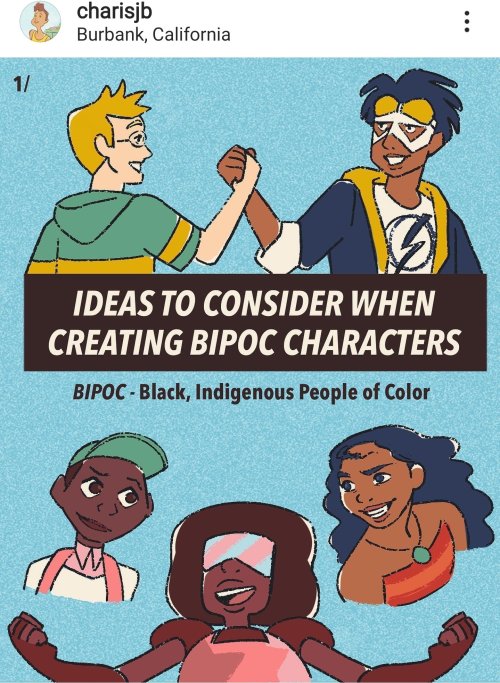
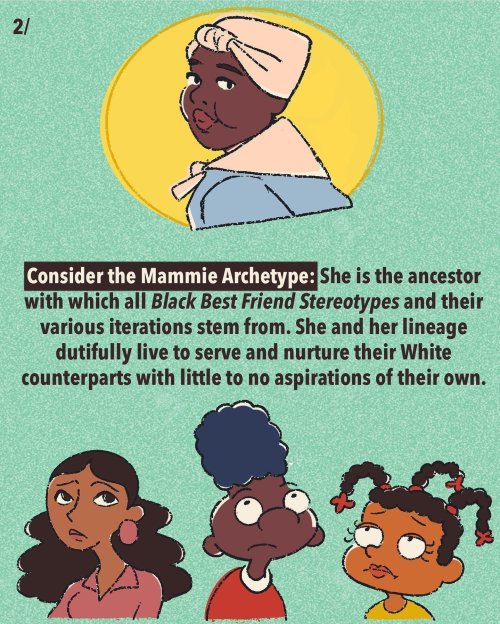
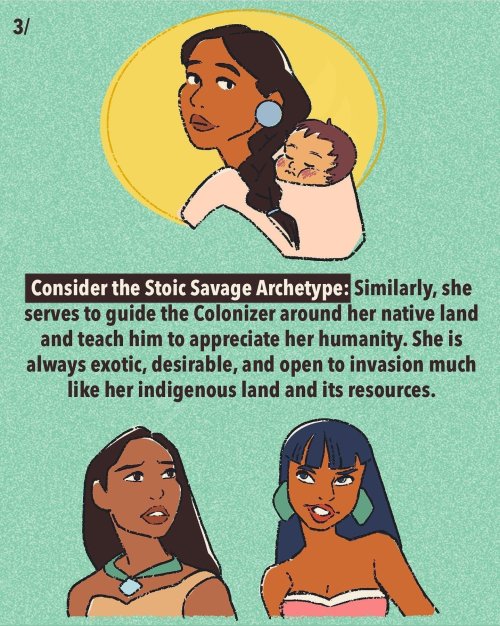
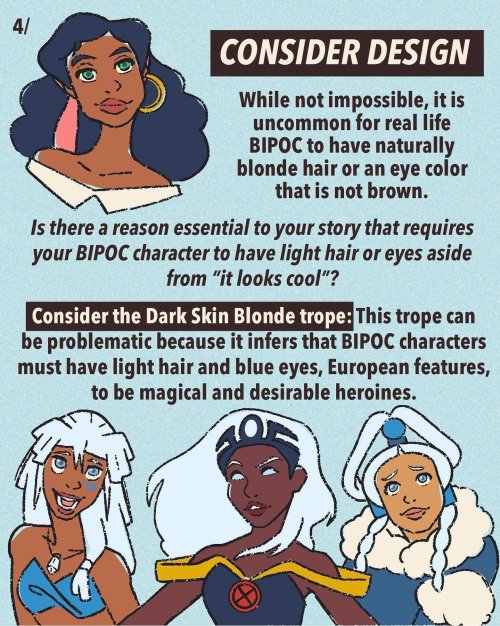
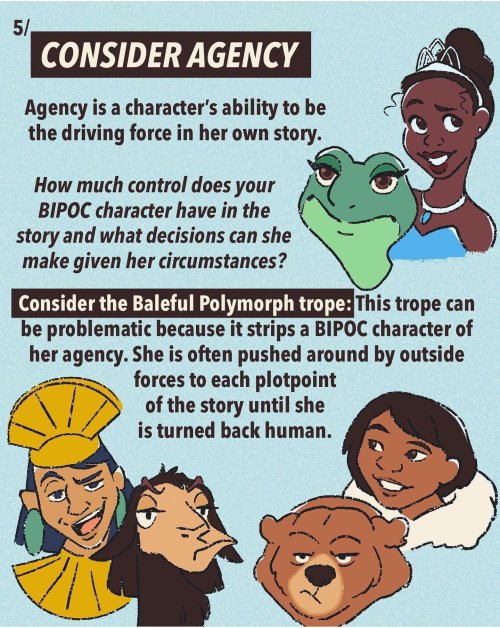

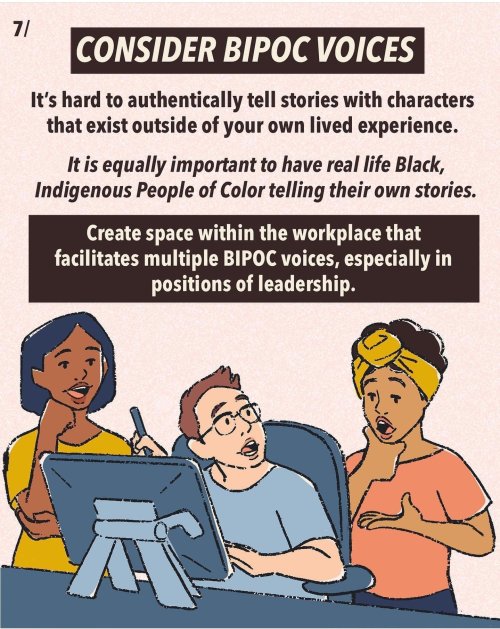
Important ideas to consider when creating characters who are black and indigenous people of color. (x)



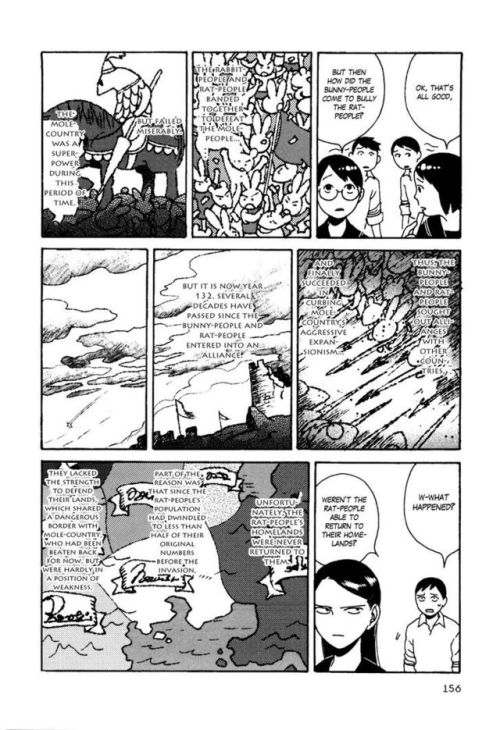



Distant Utopia - from ひきだしにテラリウム (Terrarium in a Drawer) by Ryoko Kui
now that Dungeon Meshi has an official English translation, i hope someday Kui’s other work will get translated too. this anthology was really good, and this story was one of my favorites
Someone on Reddit made the mistake of saying, "Teach me how this conflict came about" where I could see it.
Let me teach you too.
The common perception is that Jews came out of nowhere, stole Palestinian homes and kicked Palestinians out of them, and then bombed them for 75 years, until they finally rebelled in the form of Hamas invading Israel and massacring 22 towns in one day.
The historical reality is that Jews have lived there continuously for at least 3500 years.
There are areas, like Meggido iirc, with archeological evidence of continuous habitation for 7,000 years, but Jewish culture as we recognize it today didn't develop until probably halfway through that.
Ethnic Jews are the indigenous people of this area.
Indigeneity means a group was originally there, before any colonization happened, and that it has retained a cultural connection to the land. History plus culture.
That's what Jews have: even when the diaspora became larger than the number of Jews in Israel, the yearning to return to that homeland was a daily part of Jewish prayer and ritual.
The Jewish community in Israel was crushed pretty violently by the Roman Empire in 135 CE, but it was still substantial, sometimes even the majority population there, for almost a thousand years.
The 600s CE brought the advent of Islam and the Arab Empire, expanding out from Saudi Arabia into Israel and beyond. It was largely a region where Jews were second-class citizens. But it was still WAY better than the way Christian Europe treated Jews.
From the 700s-900s, the area saw repeated civil wars, plagues, and earthquakes.
Then the Crusades came, with waves of Christians making "pilgrimages to the Holy Land" and trying to conquer it from Muslims and Jews, who they slaughtered and enslaved.
Israel became pretty well depopulated after all that. It was a very rough time to live there. (And for the curious, I'm calling it Israel because that's what it had been for centuries, until the Romans erased the name and the country.)
By the 1800s, the TOTAL population of what's now Israel and Palestine had varied from 150,000 - 275,000 for centuries. It was very rural, very sparsely populated, on top of being mostly desert.
In the 1880s, Jews started buying land and moving back to their indigenous homeland. As tends to happen, immigration brought new projects and opportunities, which led to more immigration - not only from Jews, but from the Arab world as well.
Unfortunately, there was an antisemitic minority spearheaded by Amin al-Husseini. Who was very well-connected, rich, and from a politically powerful family.
Al-Husseini had enthusiastically participated in the Armenian Genocide under the Ottoman Empire. Then the Empire fell in World War One, and the League of Nations had to figure out what to do with its land.
Mostly, if an area was essentially operating as a country (e.g. Turkey), the League of Nations let it be one. In areas that weren't ready for self-rule, it appointed France or Britain to help them get there.
In recognition of the increased Jewish population in their traditional, indigenous homeland, it declared that that homeland would again become Israel.
As in, the region was casually called Palestine because that was the lay term for "the Holy Land." It had not been a country since Israel was stamped out; only a region of a series of different empires. And the Mandate For Palestine said it was establishing "a national home of the Jewish people" there, in recognition of "the historical connection of the Jewish people with Palestine and to the grounds for reconstituting their national home in that country."
Britain was appointed to help the Arab and Jewish communities there develop systems of self-government, and then to work together to govern the region overall.
At least, that was the plan.
Al-Husseini, who was deeply antisemitic, did not like this plan.
And, extra-unfortunately, the British response to al-Husseini inciting violent anti-Jewish riots was to put him in a leadership role over Arab Palestine.
They thought it would calm him down and perhaps satisfy him.
They were very wrong.

He went on to become a huge Hitler fanboy, and then a Nazi war criminal. He co-created the Muslim Brotherhood - which Hamas is part of - with fellow fascist fanboy Hassan al-Banna.

He got Nazi Party funding for armed Muslim Brotherhood militias to attack Jews and the Brits in the late 30s, convincing Britain to agree to limit Jewish immigration at the time when it was most desperately needed.
He started using the militias again in 1947, when the United Nations voted to divide the mandated land into a Jewish homeland and a Palestinian one.
Al-Husseini wouldn't stand for a two-state solution. He was determined to tolerate no more than the subdued, small Jewish minority of second-class citizens that he remembered from his childhood.
As armed militias increasingly ran riot, the Arab middle and upper classes increasingly left. About 100,000 left the country before May 1948, when Britain was to pull out, leaving Israel and Palestine to declare their independence.
The surrounding nations didn't want war. They largely accepted the two-state solution.
But al-Husseini lobbied HARD. And by mobilizing the Muslim Brotherhood to provide "destabilizing mass demonstrations and a murderous campaign of intimidation," he got the Arab League nations to agree to invade, en masse, as soon as Britain left.


About 600,000 Arabs fled to those countries during the ensuing war.
Jews couldn't seek refuge there; in fact, most of those countries either exiled their Jews directly, confiscating their property first, or else made Jewish life unlivable and exploited them for underpaid or slave labor for years first.

By the time the smoke cleared and a peace treaty was signed, most of the Arab Palestinian community had fled; there was no Arab Palestinian leadership; many of the refugees' homes and businesses had left had been destroyed in the war; and Israel had been flooded with nearly a million refugees from the Arab League countries and the Holocaust - even more people than had fled the war.
That was the Nakba. The one that gets portrayed as "750,000 Palestinians fled or were expelled!" in the hope that you'll assume they were expelled en masse, their beautiful intact homes all stolen.
Egypt had taken what's now the Gaza Strip in that war, and Jordan took what's now the West Bank - expelling or killing all the Jews in it first.
(Ironically, Jordan was originally supposed to be part of Israel. Britain, inexplicably, cut off what would have been 75% of its land to create Jordan.

Even more inexplicably, nobody ever talks about it. I've never seen anyone complain that Jordan was stolen from Palestinians. Possibly because Jordan is also the only country that gave Palestinian refugees full citizenship, and it's about half Palestinian now.
Israel is nearly 25% Arab Palestinians with full citizenship and equal rights, so it's not all that different -- but the fundamental difference of living in a country where the majority is Jewish, not Muslim, probably runs pretty deep.)
Anyway: that's why Palestine is Gaza and the West Bank, rather than being some contiguous chunk of land. Or being the land set aside by the U.N. in 1947.
Because Arab countries took that land in 1948, and treated them as essentially separate for 20 years.
Israel got them back, along with the Golan Heights and the Sinai Peninsula, in the next war: 1967, when Egypt committed an act of war by taking control of the waterways and barring Israel from them. It gave the Sinai back to Egypt as part of the 1979 peace accords between Egypt and Israel.
Israel tried to give back the Gaza Strip at the same time. Egypt refused.
Palestine finally declared independence in 1988.
But Hamas formed at about the same time. Probably in response, in fact. Hamas is fundamentally opposed to peace negotiations with Israel.
Again: Hamas is part of a group founded by Nazis.
Hamas has its own charter. It explains that Jews are "the enemy," because they control the drug trade, have been behind every major war, control the media, control the United Nations, etc. Basic Nazi rhetoric.
It has gotten adept at masking that rhetoric for the West. But to friendlier audiences, its leaders have consistently said things like, "People of Jerusalem, we want you to cut off the heads of the Jews with knives. With your hand, cut their artery from here. A knife costs five shekels. Buy a knife, sharpen it, put it there, and just cut off [their heads]. It costs just five shekels."

(Palestinians were outraged by this speech. Palestinians, by and large, absolutely loathe Hamas.

It's just that it's not the same to say that to locals, as it is to say it where major global powers who oppose this crap can hear you.)
Hamas has stated from the beginning that its mission is to violently destroy Israel and take over the land.
It has received $100M in military funding annually, from Iran, for several years. Because Iran has been building a network of fascist, antisemitic groups across the Middle East, in a blatant attempt to control more and more of it: Hezbollah in Lebanon. The Houthis in Yemen.
Iran has been run by a very far-right, deeply antisemitic dictatorship for decades now, which pretty openly wants to take down both Israel and the U.S.
Last year, Iran increased Hamas's funding to $350M.
The "proof of concept" invasion of Israel that Hamas pulled off on October 7th more than justifies a much bigger investment.
Hamas has publicly stated its intention to attack "again and again and again," until Israel has been violently destroyed.
That is how this conflict came about.
A Nazi group seized power in Gaza in 2007 by violently kicking the Palestinian government out, and began running it as a dictatorship, using it to build money and power in preparations for exactly this.
And people find it shockingly easy to believe its own hype about being "the Palestinian resistance."
As well as its propaganda that Israel is not actually targeting Hamas: it's just using a literal Nazi invasion and massacre as an excuse to randomly commit genocide of the fraction of Palestine it physically left 20 years ago.
Despite the fact that Palestinians in Gaza have been protesting HAMAS throughout the war.

Just repeating this.
PLEASE BE CAREFUL WHO YOU SIGNAL BOOST
There are a lot of fraudulent Palestinian fundraisers going around Tumblr and Go Fund Me right now. (Just had one in my recommended posts)
And unfortunately Tumblr doesn't have a clear way to report fraud or fraudulent posts.
It sucks but there are a lot of disgusting people willing to use the horrors in Gaza to steal money from actual charities.
How to help tell if a fundraiser is likely fraudulent:
- It's a brand new account
- They only reblog posts about Palestine / Israel
-Its only original post is the fake fundraiser.
-Reverse image searching usually reveals the pictures to be stolen from somewhere. Or for the lazy ones they're AI generated.
- It spam tags a load of unrelated subjects (usually trending or popular ones)
- It links to a random PayPal
If you want to donate please give through official channels or through reputable charities. Unfortunately you cannot trust Go Fund Me to vet their fundraisers.
An under-talked about part of Columbo is the way it presents non-murderers. Most episodes have at least a few scenes where Columbo talks to people involved in the case who, you know, aren't the ones who killed the victim, and in those scenes to see a multitude of ways people handle grief (or, if not grief exactly, the simple shock of someone you know no longer being around). I'm watching one of my favorite episodes right now, the one with Leonard Nimoy as the killer, and Columbo is interviewing one of the victim's co-workers, a nurse, and she just keeps going on an on about how much better the victim was morally than her - how the victim really cared about healing people as opposed to herself, who only wants to advance her career. And in this brief, minute-long interaction you get both the comic relief of Columbo quickly realizing this woman will provide almost no useful information but being unable to get her to stop talking without being rude, and a very clear illustration of how the victim was inspiring to others and how this co-worker in particular not only admired her, but feels inadequate for not living up to her. It's a very short interaction, easy to ignore in the scope of the episode (Leonard Nimoy gives SUCH a good performance as a villain it'd be hard to talk about anything else), but it all adds a humanity to the episode that would be sorely missing without it. If you didn't care about the murder before, you sure as hell do now, and you know Columbo is a better person than the killer because he actually cares about the effect these murders have on people enough not to coldly shut down a grieving friend of the victim when she's rambling on about her feelings.
Anyway, I know this is a hot take for Tumblr, but Columbo is really great.
So I’ve been thinking about rational vs. irrational character decisions.
An irrational decision is great when your story is driven by your character’s personal flaws and struggles, and for crafting situations where your audience knows that these decisions are unavoidable because they are perfectly in character. Having your characters be perfectly able to solve their problems if they weren’t, y’know, themselves, is so very hard-hitting, and can be a fantastic part of a narrative.
The downfall with irrational decisions is that it can make situations seem less dire or make your antagonists seem less dangerous. If your characters are falling over themselves and their own personal issues, then it’s hard to show how the external problems in your story pose a serious threat, because you can’t demonstrate how they’re hard to deal with if your characters aren’t making solidly competent attempts in the first place.
Rational decisions are great for stories where most of your problems are external, like your characters trying to build a spaceship or infiltrate the bad guy’s lair. It’s also key to any horror writing, where you need your characters to be competent in order for your danger to be credible; if your audience spends the entire time wondering why your protagonists aren’t doing very obvious things to solve their problems, it’ll be a lot harder to get a properly spooky atmosphere going. But if your characters are only ever making the most optimal, logical choices without ever struggling, they won’t be very compelling, so just like with irrational decision-making, there’s a time and a place for this.
Ideally, you want some combination of both rational and irrational character choices. And maybe even more importantly, whatever choice a character’s making needs to be one that makes sense for them given everything you’ve already shown in the narrative so far. If the decision feels forced or contrived, then it doesn’t matter if it’s rational or not, because it’s not a choice that fits with the rest of the story.
But, yeah, ultimately, both types of character decisions are useful tools, and it’s less about one or the other being right, and more about both of these tools being useful for different types of situations.
it's interesting to me that torture just works to us, as a literary device. It's everywhere in movies and stories and whatnot, from big-budget dramas to little grindhouse short stories. It fits neatly into the requirements of plot: character doesn't want to offer information, Gets Tortured, has to offer information.
the issue with this is that it isn't how it works.
torture is a display of power. It fouls interrogation, this is known; a person being tortured will tell you whatever you want to hear to make it stop, which is more often than not a lie, made up on the spot, or if the truth an incomplete and useless version of it. It isn't generally done for information's sake anyway, but as a form of what the ancient Greeks called hybris, the violent exhibition of your power over another person.
This is, every once in a great while, done right in fiction, but it's a challenge to write vs. the idea that it's a shortcut to one character revealing plot-critical information to another. Pretty much every form of torture works this way, even the ones that are legally permissible. Psychological torment or physical discomfort also produce an animalistic desire to escape harm and foul interrogation. The forms of torture the cops can do? The cops do it not to gain information (or if they think it will, they're lying to themselves) but because it makes them feel powerful.
There's probably a master's thesis in it for somebody studying the rise of torture as a plot device since the beginning of the war on terror and the contemporaneous development of the Broken Windows theory of policing. I'm not really aware of any similar level of disconnect between what Works in fiction and what happens in real life!
Robot disabilities. Robot who charges slowly and loses power incredibly fast and is always tired. Robot with malfunctioning lenses and can’t process visual information properly. Robot that can’t process anything too large and at a fast rate or else they’ll shut down. Robot with limbs screwed on too loose/just can’t attach correctly, so if they’re not careful they fall out. Robot disabilities,,,
At-will employment is inherently ableist garbage.
I've seen my partner go through 3 different jobs that all found various ways to fire them or pressure them to quit because the "accommodations" given helped nobody but the company.
When you give companies the power to terminate employment at their own discretion, they will use it at every opportunity they can, especially towards people who are deemed "difficult" (i.e., disabled).
They will always find a way around discrimination laws.
Genocide experts warn that India is about to genocide the Shompen people
Who are the Shompen?
The Shompen are an indigenous culture that lives in the Great Nicobar Island, which is nowadays owned by India. The Shompen and their ancestors are believed to have been living in this island for around 10,000 years. Like other tribes in the nearby islands, the Shompen are isolated from the rest of the world, as they chose to be left alone, with the exception of a few members who occasionally take part in exchanges with foreigners and go on quarantine before returning to their tribe. There are between 100 and 400 Shompen people, who are hunter-gatherers and nomadic agricultors and rely on their island's rainforest for survival.

Why is there risk of genocide?
India has announced a huge construction mega-project that will completely change the Great Nicobar Island to turn it into "the Hong Kong of India".
Nowadays, the island has 8,500 inhabitants, and over 95% of its surface is made up of national parks, protected forests and tribal reserve areas. Much of the island is covered by the Great Nicobar Biosphere Reserve, described by UNESCO as covering “unique and threatened tropical evergreen forest ecosystems. It is home to very rich ecosystems, including 650 species of angiosperms, ferns, gymnosperms, and bryophytes, among others. In terms of fauna, there are over 1800 species, some of which are endemic to this area. It has one of the best-preserved tropical rain forests in the world.”
The Indian project aims to destroy this natural environment to create an international shipping terminal with the capacity to handle 14.2 million TEUs (unit of cargo capacity), an international airport that will handle a peak hour traffic of 4,000 passengers and that will be used as a joint civilian-military airport under the control of the Indian Navy, a gas and solar power plant, a military base, an industrial park, and townships aimed at bringing in tourism, including commercial, industrial and residential zones as well as other tourism-related activities.
This project means the destruction of the island's pristine rainforests, as it involves cutting down over 852,000 trees and endangers the local fauna such as leatherback turtles, saltwater crocodiles, Nicobar crab-eating macaque and migratory birds. The erosion resulting from deforestation will be huge in this highly-seismic area. Experts also warn about the effects that this project will have on local flora and fauna as a result of pollution from the terminal project, coastal surface runoff, ballasts from ships, physical collisions with ships, coastal construction, oil spills, etc.
The indigenous people are not only affected because their environment and food source will be destroyed. On top of this, the demographic change will be a catastrophe for them. After the creation of this project, the Great Nicobar Island -which now has 8,500 inhabitants- will receive a population of 650,000 settlers. Remember that the Shompen and Nicobarese people who live on this island are isolated, which means they do not have an immune system that can resist outsider illnesses. Academics believe they could die of disease if they come in contact with outsiders (think of the arrival of Europeans to the Americas after Christopher Columbus and the way that common European illnesses were lethal for indigenous Americans with no immunization against them).
And on top of all of this, the project might destroy the environment and the indigenous people just to turn out to be useless and sooner or later be abandoned. The naturalist Uday Mondal explains that “after all the destruction, the financial viability of the project remains questionable as all the construction material will have to be shipped to this remote island and it will have to compete with already well-established ports.” However, this project is important to India because they want to use the island as a military and commercial post to stop China's expansion in the region, since the Nicobar islands are located on one of the world's busiest sea routes.
Last year, 70 former government officials and ambassadors wrote to the Indian president saying the project would “virtually destroy the unique ecology of this island and the habitat of vulnerable tribal groups”. India's response has been to say that the indigenous tribes will be relocated "if needed", but that doesn't solve the problem. As a spokesperson for human rights group Survival International said: “The Shompen are nomadic and have clearly defined territories. Four of their semi-permanent settlements are set to be directly devastated by the project, along with their southern hunting and foraging territories. The Shompen will undoubtedly try to move away from the area destroyed, but there will be little space for them to go. To avoid a genocide, this deadly mega-project must be scrapped.”
On 7 February 2024, 39 scholars from 13 countries published an open letter to the Indian president warning that “If the project goes ahead, even in a limited form, we believe it will be a death sentence for the Shompen, tantamount to the international crime of genocide.”
How to help
The NGO Survival International has launched this campaign:

From this site, you just need to add your name and email and you will send an email to India's Tribal Affairs Minister and to the companies currently vying to build the first stage of the project.
Share it with your friends and acquittances and on social media.
Sources:
India’s plan for untouched Nicobar isles will be ‘death sentence’ for isolated tribe, 7 Feb 2024. The Guardian.
‘It will destroy them’: Indian mega-development could cause ‘genocide’ and ‘ecocide’, says charity, 8 Feb 2024. Geographical.
Genocide experts call on India's government to scrap the Great Nicobar mega-project, Feb 2024. Survival International.
The container terminal that could sink the Great Nicobar Island, 20 July 2022. Mongabay.
[Maps] Environmental path cleared for Great Nicobar mega project, 10 Oct 2022. Mongabay.
not to be pretentious, but a lot of stuff you guys complain is being ruined by capitalism/the algorithm/whatever can be solved by consuming something else than the most basic mainstream stuff that's thrown in your lap. "songs nowadays are getting shorter to fit entire tiktoks and it's ruining music" have you tried listening to something else than Spotify's Top 100 my dude? "fanfiction-to-publishing pipeline is churning out mediocre books and it's ruining literature" have you tried reading something outside the NYT bestseller list my dude? This is not a post about how algorithm based industries give visibility to the lowest common denominator art at the expense of actually creative and meaningful art that struggles to make itself known, which is a valid discussion for another time, this is about people actively not giving this kind of art their visibility because they won't get out of their way to discover stuff outside the mainstream radar and prefer to be passively fed what to consume while bitching that is not up to their tastes.
on the topic of not using AI for research, also be aware of using automatic Google results because they rely on AI too and don't ACTUALLY know what they're talking about
case in point: oh let's Google what flowers are safe for cats!
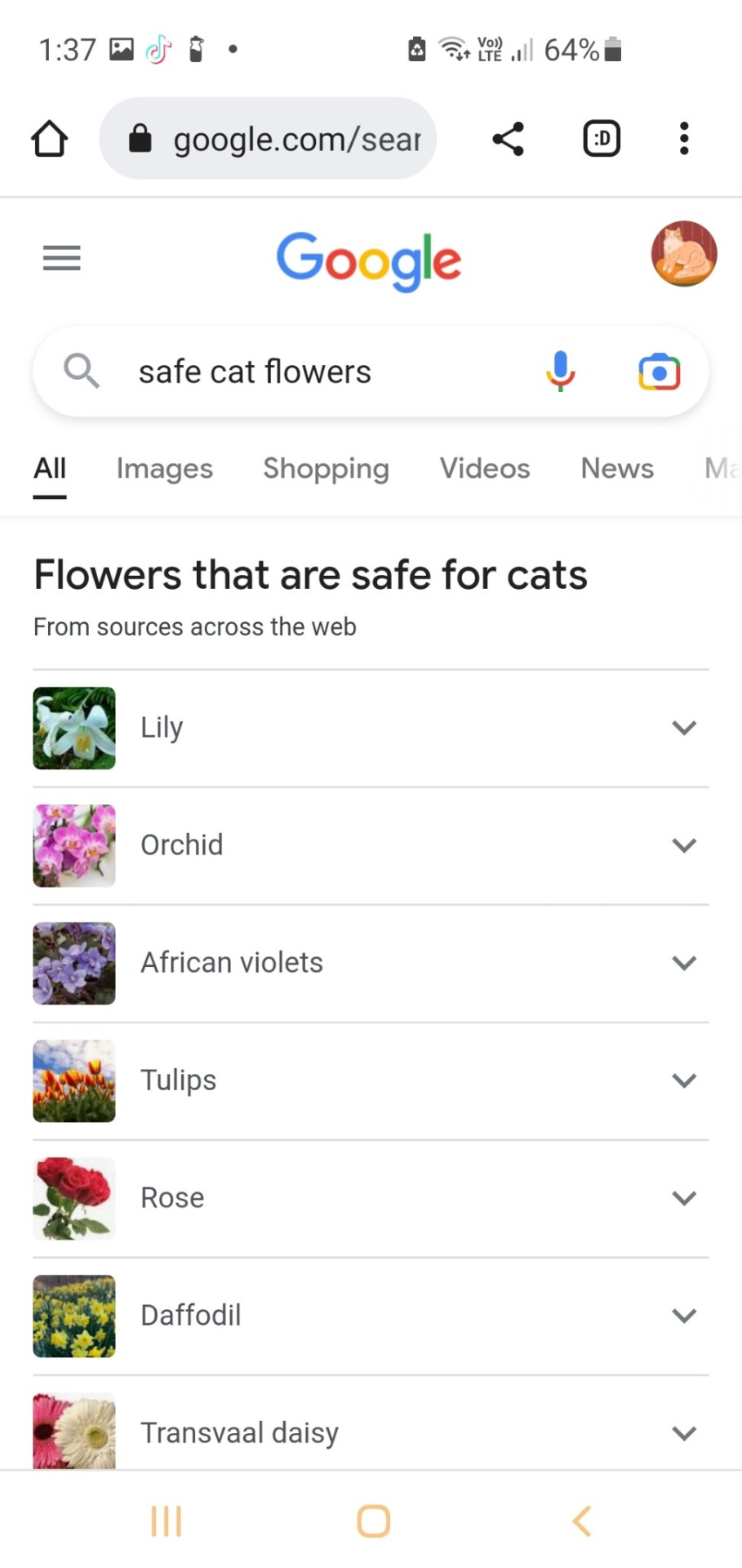
Google: lilies! source? trust me bro
Lilies?
You mean perhaps the most poisonous plant for cats there is? that can cause sudden Organ Shut Down and Death? Thanks Google! Good thing I can rely on your handy suggestions so I don't have to click on any actual websites and read to make sure your information is correct! (Also tulips and daffodils will also definitely Smite your cat but I'm not sure about the other flowers)
remember just because Google or an AI is telling you something confidently doesn't mean it actually knows what it's talking about
I trust no seasoned writer or researcher does this but this is more a message to newer or younger writers or anyone with less experience with Google and how it works
Hot take: Actual literary analysis requires at least as much skill as writing itself, with less obvious measures of whether or not you’re shit at it, and nobody is allowed to do any more god damn litcrit until they learn what the terms “show, don’t tell” and “pacing” mean.
be pro-aging but wear sun screen. sun protection is not beauty industry propaganda it will save you. wear it. or else.
If You’re Gonna Make Something Wheelchair Accessible, Don’t Make it a Thing
Here’s some examples awkward accessibility being a thing:
Your at a hotel that has a lift to get you from one sub-floor to another, but the lift can only be unlocked and operated by one specific person that the hotel now has to go find. Sure, they’ve made the entrance to the sub-floor is accessible, but now it’s a thing.
The buses are wheelchair accessible but the driver has to stop the bus, take 30 seconds to lower the goddamn ramp, move passengers out of their seats, hook up the straps and then secure you in the bus. Sure, they’ve made the busses accessible but now it’s a thing.
The restaurant has an accessible entrance, but it’s past the trash room and through the kitchen. Sure, the restaurant is accessible, but now it’s an insulting thing.
Here’s some great examples of accessibility not being a thing:
The train to the airport pulls up flush with the platform. I board with everyone else and sit wherever the fuck I want. Riding the train is accessible and not a thing.
In Portland, I press a button the side of the streetcar and a ramp automatically extends at the same time the door opens. I board in the same amount of time as everyone else. This is not a thing.
I get that it is difficult to design for wheelchair accessibility, but folks need to start considering the overall quality of the experience versus just thinking about meeting the minimum requirements.
As a rule of thumb, don't reblog donation posts or people asking for donations unless they've been vetted and reblogged by Palestinian bloggers. We usually go to lengths to verify this shit because we know scammers have been faking to get people to send them money, using the urgency of our genocide as bait.
It's disgusting this is what we're dealing with, but people are losing money because of some truly evil people out there.
Accounts don't just randomly spring up on tumblr without gofundmes while asking for someone to help them create a campaign. Fuck out of here with that shit.
I bring a real "many female characters also have these traits you love male characters for" and "many of your fave male characters have done the same things you hate female characters for" vibe to the conversation they female character haters don't enjoy
this has been said before but I also think that part of the problem is that we need to stop seeing “misogynist” and “transphobe” and “ableist” etc as IDENTITIES and start seeing them as ACTIONS and WORLDVIEWS that cause a specific type of harm
the concept of fatphobia isn't "skinny people have never ever been shamed or insecure about their bodies ever" but rather "society literally doesn't want fat people to exist at any cost to the point healthcare systems are willing to let fat people die rather than address any other possible medical issue, in addition to facing insults and disgust at every turn socially". online the fact u can't make a body positive or even neutral post without somebody going "but what about us naturally skinny and petite people" is so fucked man
I think that the worst and most dangerous misconception people have about fascism is that it's this sort of turbocharged "Beast Mode" that countries can go into to increase their production, win wars, and make the trains run on time, and that the primary objections to it centre on whether the "obvious" increase in efficiency that fascism offers is worth the loss of freedom and lives. But in reality fascist regimes like to put up a *façade* of strength and efficiency, even as they practice corruption on a scale unimaginable in democracies and even as the public interest is hollowed out by parasitical opportunists. There is no trade-off; fascism is a grift all the way down.
People really need to realise that “media can affect real life” doesn’t mean “this character does bad things so people will read that and start doing bad things” and actually means “ideas in fiction especially stereotypes about minority groups can affect how the reader views those groups, an authors implicit prejudices can be passed on to readers”








